Is China finally seeing the end of the pandemic?
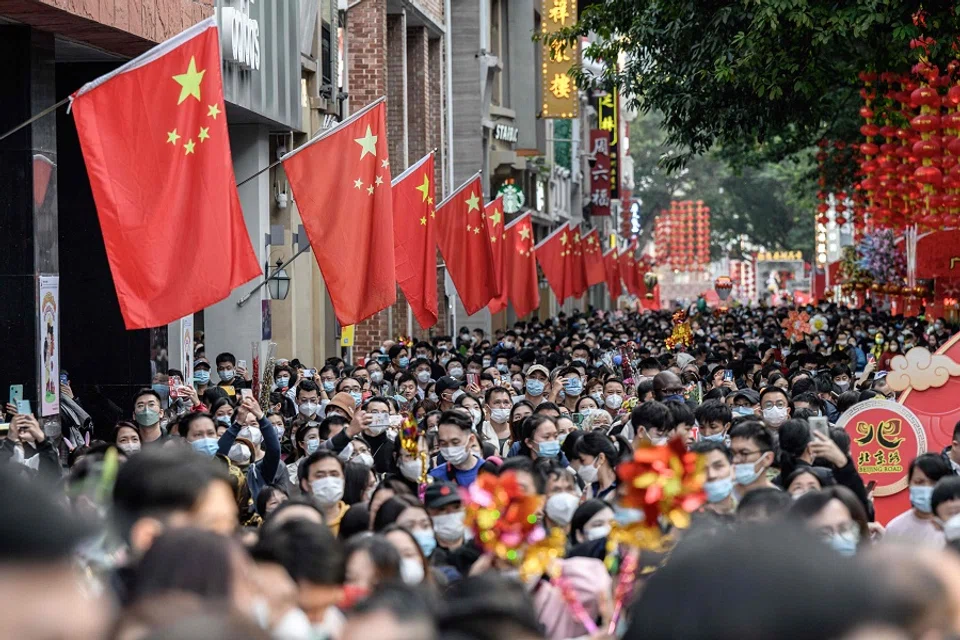
Is the three-year-long Covid-19 pandemic coming to an end?
After massively rolling back its Covid measures in early December 2022, China experienced a severe Covid-19 outbreak in January. This triggered fears that a greater outbreak would hit rural China during the Spring Festival celebrations amid a shortage of healthcare resources.
However, with the Spring Festival holiday period now over, official Covid statistics and public sentiment are showing rather unexpected indicators.
According to the Chinese Center for Disease Control and Prevention (Chinese CDC)'s preliminary analysis of national data on the diagnosis, treatment and surveillance of Covid-19 infections published on 25 January, China's latest Covid-19 outbreak had peaked in late December last year, then steadily declined across all provinces, both urban and rural. Figures for the number of outpatients, critical and severe cases, as well as deaths in hospitals have also been falling.
... the Chinese CDC concluded that the current Covid-19 wave in China was "nearing its end".
The report added that during the Spring Festival holidays, there was no significant rebound in cases and no new variant identified so far either. As such, the Chinese CDC concluded that the current Covid-19 wave in China was "nearing its end".
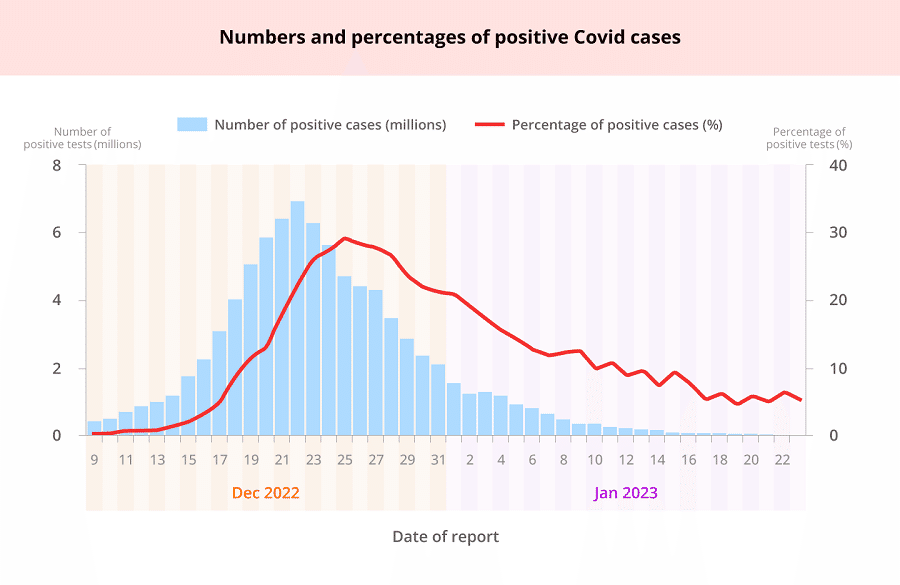
In a People's Daily Health article, Fang Bangjiang, director of Shanghai University of Traditional Chinese Medicine's institute of critical care and severe illness, gave his response to the report on 27 January saying that the transmission of the virus has gradually "weakened". This became a trending topic on Weibo the next day.
In Fang's view, the transmission of Covid-19 has weakened not because the virus has changed significantly but because the low level of transmission in society has strengthened the immune barrier. Coupled with the fact that the vast majority of the population has been infected with Covid-19, herd immunity has been reached.
Mi Feng, spokesperson for the National Health Commission (NHC), said on 30 January, at the first press conference of the State Council's Joint Prevention and Control Mechanism after the Spring Festival break, that control measures had been implemented in a smooth and orderly manner during the holidays. He said, "The overall epidemic situation in the country has entered a low level, and the epidemic situation in various places has maintained a steady downward trend."
That same night, media personality and Global Times former editor-in-chief Hu Xijin reposted the NHC's statement, writing: "China's breakout [of the pandemic] is a success." He added that China was now at the same starting line as other countries and has brought three years of the pandemic to an end.
... from now on, facing similar infection risks with the rest of the world, China will not be any more vulnerable than others because of its reopening.
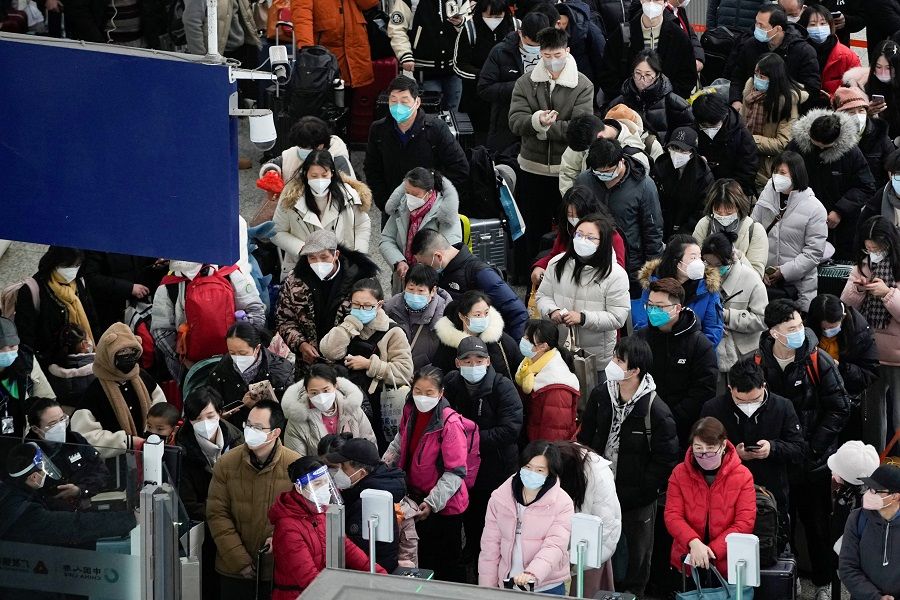
In his view, China has passed the Covid-19 test with flying colours. It successfully sidestepped the period when the pandemic was at its most ferocious, and it was reporting far less actual Covid deaths than that in developed countries such as the US and Europe. He further surmised that while the number of hospital Covid deaths was lower than the actual toll, the country's death toll would never reach four times that of the US's 1.1 million deaths.
Hu's claim that China's Covid death toll would never be four times that of the US seems to be based on China's population being about four times larger than that of the US; as its Covid death toll is not four times larger, China's death toll is lower than that of the US.
Hu further noted that China did not slacken in its economic and social development even when the country imposed strict anti-Covid measures. Thus from now on, facing similar infection risks with the rest of the world, China will not be any more vulnerable than others because of its reopening.
'Downgrading' Covid-19
World Health Organization (WHO) director-general Tedros Adhanom Ghebreyesus said at a press conference on 14 December 2022 that the Covid-19 coronavirus and monkeypox outbreaks have passed their most dangerous phases. He was hopeful that the two outbreaks would no longer be global health emergencies this year.
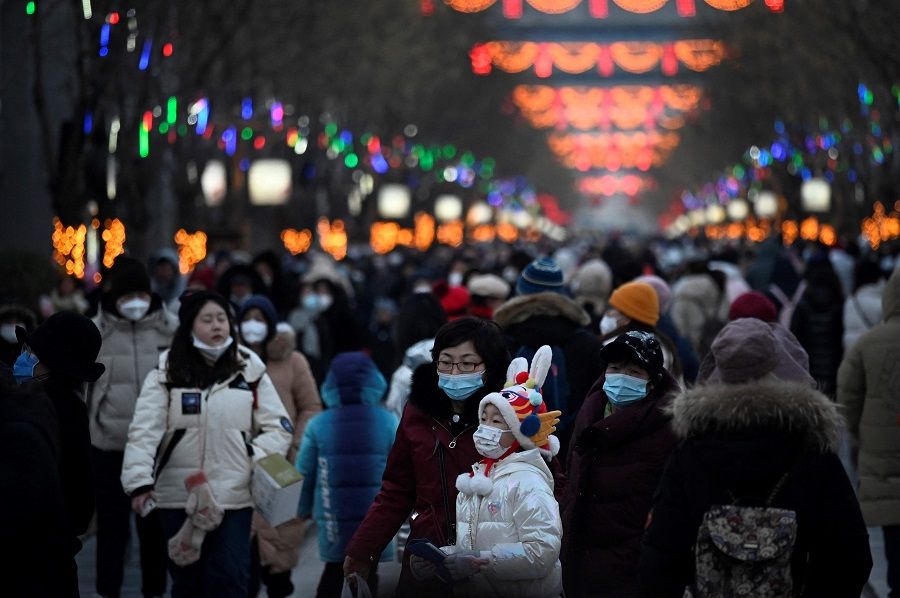
However, the WHO said in a statement on 30 January that Covid-19 remains a public health emergency of international concern, but acknowledged that the Covid-19 pandemic was at a "transition point" that needed to be navigated carefully to "mitigate the potential negative consequences".
... South Korea and Hong Kong - relatively conservative in Covid controls - have also lifted the last Covid defences: mask mandates.
This is not the first time the WHO is discussing whether to end Covid as a global emergency. In April last year, the WHO International Health Regulations Emergency Committee also discussed the same question, and the conclusion was that it was far from time to relax vigilance.
On the same day that the WHO decided that Covid remains a public health emergency, the Biden administration announced that it would end Covid emergency declarations on 11 May, after nearly three years. At the same time, South Korea and Hong Kong - relatively conservative in Covid controls - have also lifted the last Covid defences: mask mandates.
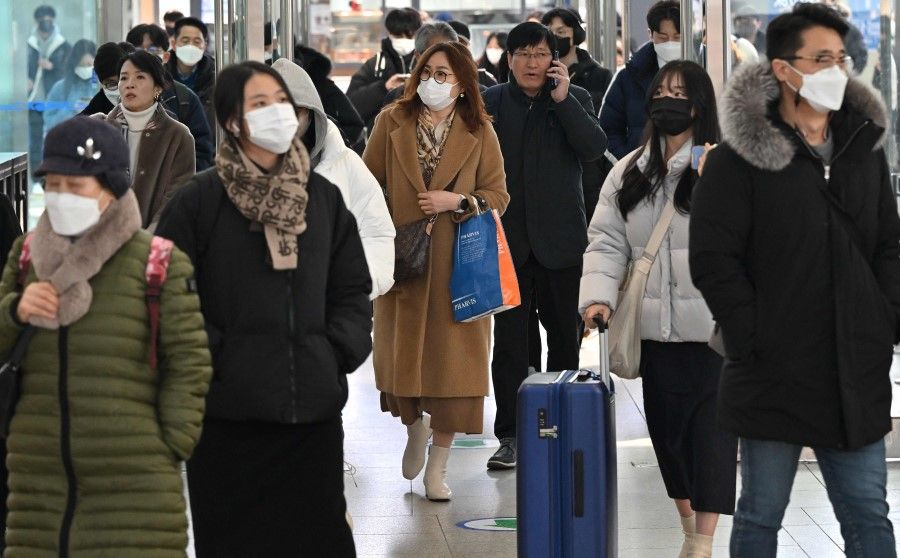
From 30 January, it became no longer mandatory to wear face masks in most indoor spaces, except on public transport and in medical facilities. Experts say that mask mandates might be totally lifted as early as May.
People are mystified at this overnight disappearance of the virus that has been around for three years...
Hong Kong Chief Executive John Lee said on 31 January that the government would consider lifting the mandatory mask policy after the winter flu season.
Did Covid mysteriously disappear with solar storms?
Despite earlier fears that the Chinese New Year travel peak would lead to hundreds of millions of positive cases moving around, possibly triggering a fresh explosion of cases, the Chinese authorities and netizens alike have realised that such a scenario did not materialise. Some netizens even think that the virus "disappeared overnight".
People are mystified at this overnight disappearance of the virus that has been around for three years, and several short clips and articles have recently been circulating on we-media in China claiming evidence that a "solar storm has arrived and Covid is dead", which gained the attention of many netizens.

These articles cite information from the Shanghai Astronomical Observatory saying that between 5 and 11 January, there were three X-class solar flares - the most powerful class - that triggered three powerful solar storms. They go on to cite a popular science article relating the end of previous pandemics to solar storms, concluding that "solar storms killed Covid".
In fact, that popular science article was taken from a blog entry in a science website, written in June 2021 by a retired professor of the College of Geoexploration Science and Technology at Jilin University. The article - which did not generate much interest at the time - said that the Spanish flu in 1918 ended with a solar storm in early 1921; SARS in 2003 disappeared with a solar storm in October 2003; Middle East respiratory syndrome (MERS) in 2016 ended with the impact of a solar storm in July 2017.
... amid the praise and shifting of responsibility, many netizens are also engaging in criticism and self-reflection.
But on closer scrutiny, all these instances also fit the ancient Chinese saying that major epidemics do not last more than three years. Besides these examples, the Plague of Athens in 430 BC and the Great Plague of London in 1665 also ended within three years. Some netizens think that, solar storms or not, going by this cycle, Covid's time is just about up.
Netizens' polarised reactions
It is difficult to find authoritative evidence for such popular science and legends tinged with the metaphysical, but it reflects netizens' joy and puzzlement at the end of Covid, that can only be explained as "the wonders of nature". Some netizens also lavished praise on China's accurate timing, "easily handling Covid within a month", and thanking the country for "taking care of us for three years".
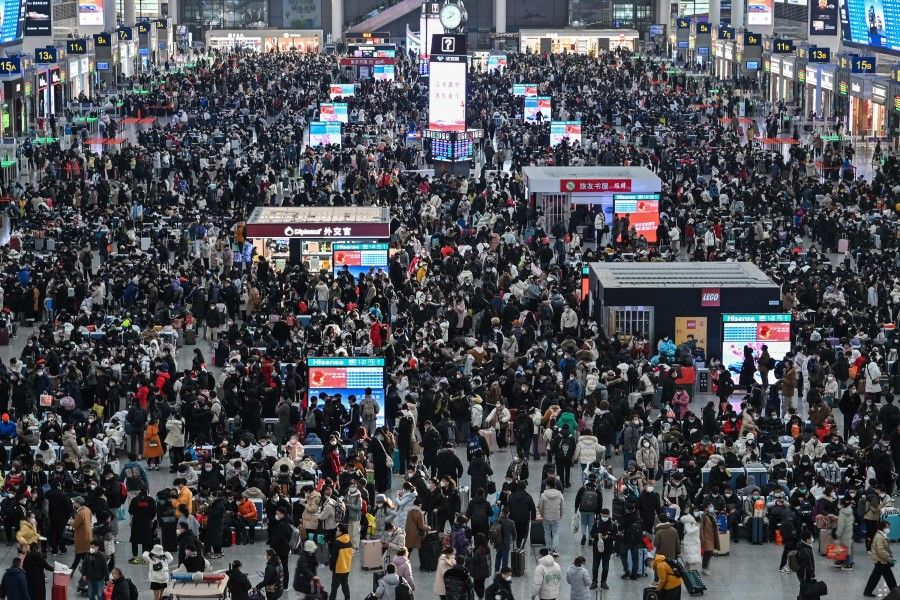
Some netizens carry on the conspiracy theory line and question if the Covid virus came from nature or whether it was manufactured by the US; if it was the latter, will the pandemic end?
It is worth noting that amid the praise and shifting of responsibility, many netizens are also engaging in criticism and self-reflection. They respond to posts to ask if stakeholders of Covid tests will continue to be investigated, why China did not open up in April 2022, and whether the authorities will release the true numbers of the first wave. Many netizens also agree with such voices.
The three-year pandemic has impacted the global situation and reshaped many people's mindsets. If the pandemic does end here, of course that would be a relief for everybody. But even in moving forward, if we look back, we would find that the questions are really of greater value.
This article was first published in Lianhe Zaobao as "中国冠病疫情走到尾声?".
Related: Chinese Covid testing firms come under fire for pandemic profiteering | Will mainland China see a 'tsunami' of Covid cases? | China's international air travel resumes, but Covid turbulence to delay takeoff | Covid protests: A repressed China needs an outlet to return to equilibrium | China's reopening will not lead to a million deaths | From zero-Covid to living with the virus: Chinese society's adaptability put to the test
